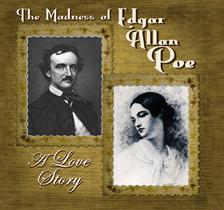THE MADNESS OF SITE-SPECIFIC THEATER
Back in 2010, First Folio presented David Rice’s site-specific theater piece, The Madness of Edgar Allan Poe: A Love Story. If any show should be heaped with awards for concept of a production – this is it. But in this year’s restaging, director Michael Goldberg proves he knows how to choreograph the show, but sadly elicits little in the way of nuance from his actors and chills from the proceedings.
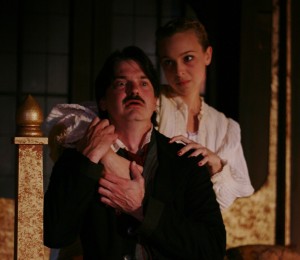 The term “site-specific theater” applies to plays which are performed in unconventional spaces compatible to the script. More often than not with this genre, scripts are written specifically for their location, which means that, again, more often than not, the play is not the thing, but instead a vehicle to interactively involve an audience. I firmly believe that Madness has become a hit because audience members move through darkened halls from room to room in the Tudor Revival Mayslake Peabody Estate. Had Rice’s play, which consists mainly of Poe’s original works truncated and loosely stitched together, been staged in a proscenium theater, it most certainly would be a strange affair: Because the audience is split into two groups after the initial scene, one senses that the ensuing scenes performed throughout the estate were written to be timed with other scenes more than written to tell the story best. Still, even with no dramatic arc to the piece, the way in which Rice weaves his own dialogue together with the writings of Poe is clever and interesting.
The term “site-specific theater” applies to plays which are performed in unconventional spaces compatible to the script. More often than not with this genre, scripts are written specifically for their location, which means that, again, more often than not, the play is not the thing, but instead a vehicle to interactively involve an audience. I firmly believe that Madness has become a hit because audience members move through darkened halls from room to room in the Tudor Revival Mayslake Peabody Estate. Had Rice’s play, which consists mainly of Poe’s original works truncated and loosely stitched together, been staged in a proscenium theater, it most certainly would be a strange affair: Because the audience is split into two groups after the initial scene, one senses that the ensuing scenes performed throughout the estate were written to be timed with other scenes more than written to tell the story best. Still, even with no dramatic arc to the piece, the way in which Rice weaves his own dialogue together with the writings of Poe is clever and interesting.
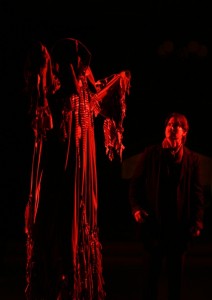 The idea behind Madness is an examination of the possible motivation behind the groundbreaking author’s work’”specifically, his recurring theme involving the death of a beautiful woman. Born into an acting family, Poe was abandoned by his father and then lost his mother to consumption by the time he was two. Unofficially “adopted” by a family in Richmond, VA, Poe spent most of his childhood abroad in Great Britain. He began writing at an early age and, back in the states, lived the stressful life of a poet trying to make a living from his writing. At the age of 27, he married his first cousin Virginia, who was 13 at the time. She died nine years later from consumption, and’”although biographers contend that the marriage was never consummated’”her illness and death had a significant influence on his work and his personal life: After Virginia’s death, Poe became an (even more) erratic and despondent alcoholic, ultimately dying two years later at the age of 40.
The idea behind Madness is an examination of the possible motivation behind the groundbreaking author’s work’”specifically, his recurring theme involving the death of a beautiful woman. Born into an acting family, Poe was abandoned by his father and then lost his mother to consumption by the time he was two. Unofficially “adopted” by a family in Richmond, VA, Poe spent most of his childhood abroad in Great Britain. He began writing at an early age and, back in the states, lived the stressful life of a poet trying to make a living from his writing. At the age of 27, he married his first cousin Virginia, who was 13 at the time. She died nine years later from consumption, and’”although biographers contend that the marriage was never consummated’”her illness and death had a significant influence on his work and his personal life: After Virginia’s death, Poe became an (even more) erratic and despondent alcoholic, ultimately dying two years later at the age of 40.
The audience is divided into two groups, which face each other in a great hall for the first scene, in which a manic and tearful Christian Gray (as Poe) paces or scribbles furiously, delivering the onomatopoeic poem “The Bells” with such an odd syntax as to make it indiscernible. Equally disturbing was the strange and very thick Southern accent, turning “Bells! Bells! Bells!” into “Bales! Bales! Bales!” Also disconcerting was Michael McNamara’s lighting design, which utilized floods that caused spectators in the front rows to shield their eyes; rarely was there a sense that the space was lit by candlelight.
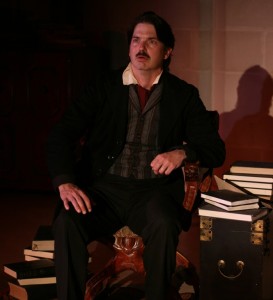 Into this scene enters the blissfully understated Diana Mair as Virginia, who later will speak of her relationship with Poe directly to audience members, which is also odd because there has been no establishment of what role the audience plays in this piece: are we spectators observing specters or are we invited guests? Also strange is Rice’s decision to interpret the Poe marriage as a nearly blissful affair, leaving little intrigue except the scene in which the winsome Annelise Lawson joins the couple in interpreting “Ligeia,” a short story which certainly emphasizes the playwright’s focus on Poe’s vast fixation with Virginia’s death, even though she contracted tuberculosis five years after the story was published.
Into this scene enters the blissfully understated Diana Mair as Virginia, who later will speak of her relationship with Poe directly to audience members, which is also odd because there has been no establishment of what role the audience plays in this piece: are we spectators observing specters or are we invited guests? Also strange is Rice’s decision to interpret the Poe marriage as a nearly blissful affair, leaving little intrigue except the scene in which the winsome Annelise Lawson joins the couple in interpreting “Ligeia,” a short story which certainly emphasizes the playwright’s focus on Poe’s vast fixation with Virginia’s death, even though she contracted tuberculosis five years after the story was published.
Later, in a tiny room, actor Robert Allan Smith makes a breathtaking entrance through a sliding wall, only to begin a rendition of “The Tell-Tale Heart” with an overwrought vocalization that left him nowhere to go but straining. Also on hand was the mannered and amateurish Daniel Gilbert as a constable who visits the recent murder scene. Ultimately, this section was rendered interminable because Goldberg does not build the scene, which in the story begins with our narrator claiming that he is not mad: “Observe how healthily’”how calmly I can tell you the whole story.” Smith was about as calm as a banshee on Red Bull.
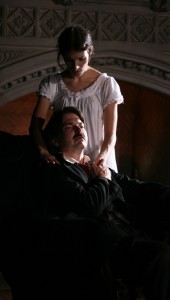 The bottom line is that a clever intermingling of Poe’s writings and private life with a clever usage of the mansion does not, in this case, make for great theater. No doubt, less discerning audience members will forgive the unconvincing storytelling and see this production simply as an ambitious, Halloween-timed event, and, therefore, will be happy that they attended.
The bottom line is that a clever intermingling of Poe’s writings and private life with a clever usage of the mansion does not, in this case, make for great theater. No doubt, less discerning audience members will forgive the unconvincing storytelling and see this production simply as an ambitious, Halloween-timed event, and, therefore, will be happy that they attended.
For all of its uniqueness and efforts’”plunging us into darkness with great sound effects by Christopher Kriz for “The Pit and the Pendulum” and a macabre party scene using Rachel Lambert’s stylish period costumes for the ultimo, “The Masque of the Red Death”’”The Madness of Edgar Allan Poe: A Love Story was a maddening affair for this critic.
photos by D. Rice
The Madness of Edgar Allan Poe: A Love Story
First Folio at Mayslake Peabody Estate in Oak Brook
scheduled to end on November 4, 2012
for tickets, call 630-986-8067 or visit http://www.firstfolio.org
for info on this and other Chicago Theater, visit http://www.TheatreinChicago.com
